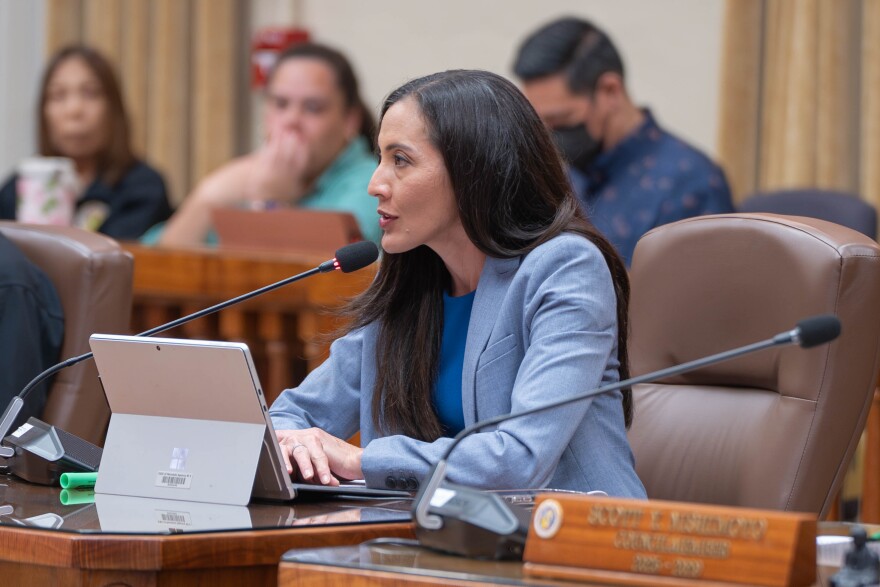The Honolulu City Council underwent significant changes in leadership last week, leading to both optimism and uncertainty about the council's direction going forward.
Last Tuesday, the council voted to promote Councilmembers Andria Tupola and Esther Kiaʻāina to the council's vice chair and floor leader, respectively. They're replacing Councilmembers Matt Weyer and Radiant Cordero, who held those positions.
Council leadership is now made up of Council Chair Tommy Waters, Tupola and Kiaʻāina — who are all Native Hawaiians.
That move was then followed by changes to council committees, which Waters has the authority to make.
Perhaps the most notable of those changes was to the council's budget committee. Councilmember Val Okimoto is now chair, replacing Councilmember Tyler Dos Santos-Tam and removing him, Weyer and Cordero entirely from the committee.

Waters believes the changes will pivot the council in a way that helps reduce Hawaiʻi residents' costs of living.
“Councilmember Kiaʻāina and Councilmember Tupola bring years of experience and maturity, and I think they will help move my agenda forward. I really do believe that the cost of living here in Hawaiʻi is really high,” Waters told Hawaiʻi Public Radio.
The move comes after a recent and controversial council vote on a new schedule for sewer fee increases. Waters said he was disappointed by the council's narrow 5-4 vote to pass a schedule for Oʻahu's fee increases, which are meant to pay for $10.1 billion in required sewer infrastructure projects on the island.
Waters, Tupola, Kiaʻāina and Councilmember Scott Nishimoto voted against the plan, likely because it didn't do enough to reduce the burden on residents.
In a news release, Waters said the new leadership is equipped to “deliver results” — namely by passing more measures he believes will help reduce the cost of living on Oʻahu.
He’s interested in taking another look at using transient accommodation taxes to pay for sewer projects, a proposed empty home tax that’s meant to tax out-of-state investors who own homes but don’t live in them, and increasing homeowner exemptions.
“I do want to look at increasing the homeowner's exemption for kūpuna, especially, but also for regular working families. I do want to look at, again, using the Oʻahu transit accommodation tax to supplement the sewer fund,” he said. “Of course, there's nine of us, right? We need five votes, so it's going to be interesting to see if we can get there.”
The proposal to change the council's vice chair and floor leader was a controversial one that drew hundreds of testimonies from the public, including many who believed the change was “political retribution” for the vote on the sewer fees.
There's also skepticism within the council about how much the new leadership can get done going forward.
“The two most legislatively productive members … have effectively been sidelined,” Dos Santos-Tam said in a text to HPR, referring to himself and Weyer. “So this really does beg the question: What specific results should we expect?”
Dos Santos-Tam said, for example, that he's “doubtful” that there are enough votes to pass an empty homes tax even with the council reorganization.
While the council and its members are nonpartisan, public testimony also questioned Tupola’s and Okimoto’s backgrounds as Republicans.

Waters said the new leadership now is more representative of the community’s political makeup, but Dos Santos-Tam wonders how the council reorganization might affect the city’s budget. He noted that Republicans nationally have supported the slashing of government spending, particularly on the federal level.
“The city is at a tenuous point, given the uncertainty around federal funding. For example, the 'Big Beautiful Bill' moving through Congress has a number of items that could negatively impact the city budget and we need to be prepared,” Dos Santos-Tam said. “Will the new leadership team, with a Trump supporter as vice chair, and a Republican budget committee chair, be willing to respond to federal cuts and draw a line in the sand if necessary to protect important federally funded city programs?”
While the reorganization has revealed fractures in the council, many of the council members say they want to continue to work collaboratively.





